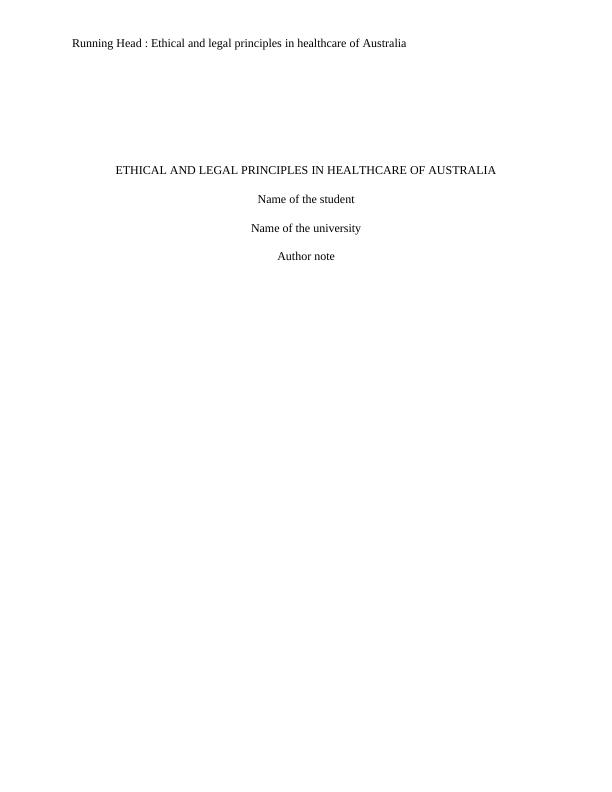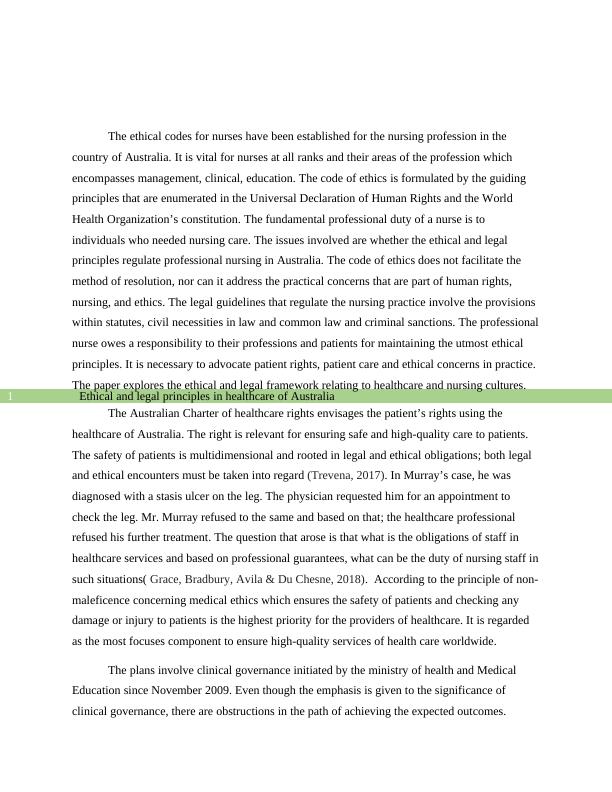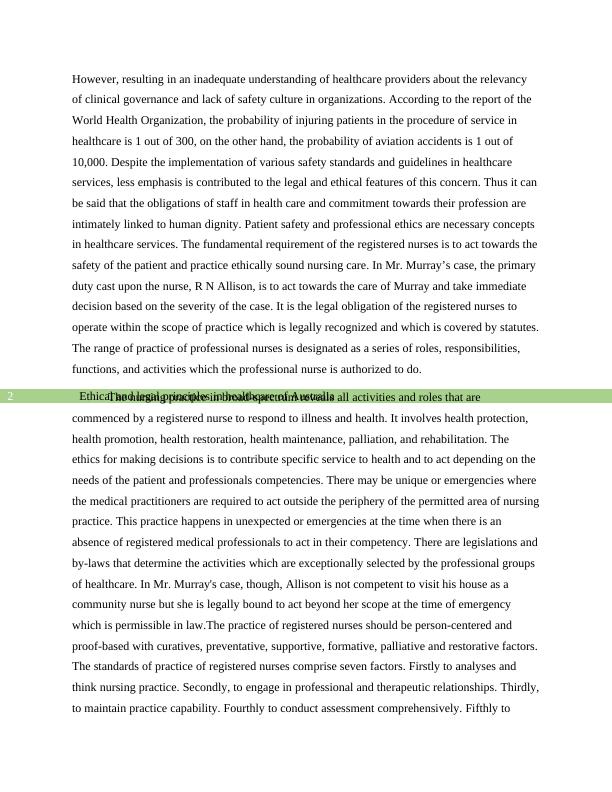Ethical and Legal Principles in Healthcare of Australia
10 Pages3083 Words32 Views
Added on 2022-08-23
Ethical and Legal Principles in Healthcare of Australia
Added on 2022-08-23
ShareRelated Documents
Running Head : Ethical and legal principles in healthcare of Australia
ETHICAL AND LEGAL PRINCIPLES IN HEALTHCARE OF AUSTRALIA
Name of the student
Name of the university
Author note
ETHICAL AND LEGAL PRINCIPLES IN HEALTHCARE OF AUSTRALIA
Name of the student
Name of the university
Author note

Ethical and legal principles in healthcare of Australia1
The ethical codes for nurses have been established for the nursing profession in the
country of Australia. It is vital for nurses at all ranks and their areas of the profession which
encompasses management, clinical, education. The code of ethics is formulated by the guiding
principles that are enumerated in the Universal Declaration of Human Rights and the World
Health Organization’s constitution. The fundamental professional duty of a nurse is to
individuals who needed nursing care. The issues involved are whether the ethical and legal
principles regulate professional nursing in Australia. The code of ethics does not facilitate the
method of resolution, nor can it address the practical concerns that are part of human rights,
nursing, and ethics. The legal guidelines that regulate the nursing practice involve the provisions
within statutes, civil necessities in law and common law and criminal sanctions. The professional
nurse owes a responsibility to their professions and patients for maintaining the utmost ethical
principles. It is necessary to advocate patient rights, patient care and ethical concerns in practice.
The paper explores the ethical and legal framework relating to healthcare and nursing cultures.
The Australian Charter of healthcare rights envisages the patient’s rights using the
healthcare of Australia. The right is relevant for ensuring safe and high-quality care to patients.
The safety of patients is multidimensional and rooted in legal and ethical obligations; both legal
and ethical encounters must be taken into regard (Trevena, 2017). In Murray’s case, he was
diagnosed with a stasis ulcer on the leg. The physician requested him for an appointment to
check the leg. Mr. Murray refused to the same and based on that; the healthcare professional
refused his further treatment. The question that arose is that what is the obligations of staff in
healthcare services and based on professional guarantees, what can be the duty of nursing staff in
such situations( Grace, Bradbury, Avila & Du Chesne, 2018). According to the principle of non-
maleficence concerning medical ethics which ensures the safety of patients and checking any
damage or injury to patients is the highest priority for the providers of healthcare. It is regarded
as the most focuses component to ensure high-quality services of health care worldwide.
The plans involve clinical governance initiated by the ministry of health and Medical
Education since November 2009. Even though the emphasis is given to the significance of
clinical governance, there are obstructions in the path of achieving the expected outcomes.
The ethical codes for nurses have been established for the nursing profession in the
country of Australia. It is vital for nurses at all ranks and their areas of the profession which
encompasses management, clinical, education. The code of ethics is formulated by the guiding
principles that are enumerated in the Universal Declaration of Human Rights and the World
Health Organization’s constitution. The fundamental professional duty of a nurse is to
individuals who needed nursing care. The issues involved are whether the ethical and legal
principles regulate professional nursing in Australia. The code of ethics does not facilitate the
method of resolution, nor can it address the practical concerns that are part of human rights,
nursing, and ethics. The legal guidelines that regulate the nursing practice involve the provisions
within statutes, civil necessities in law and common law and criminal sanctions. The professional
nurse owes a responsibility to their professions and patients for maintaining the utmost ethical
principles. It is necessary to advocate patient rights, patient care and ethical concerns in practice.
The paper explores the ethical and legal framework relating to healthcare and nursing cultures.
The Australian Charter of healthcare rights envisages the patient’s rights using the
healthcare of Australia. The right is relevant for ensuring safe and high-quality care to patients.
The safety of patients is multidimensional and rooted in legal and ethical obligations; both legal
and ethical encounters must be taken into regard (Trevena, 2017). In Murray’s case, he was
diagnosed with a stasis ulcer on the leg. The physician requested him for an appointment to
check the leg. Mr. Murray refused to the same and based on that; the healthcare professional
refused his further treatment. The question that arose is that what is the obligations of staff in
healthcare services and based on professional guarantees, what can be the duty of nursing staff in
such situations( Grace, Bradbury, Avila & Du Chesne, 2018). According to the principle of non-
maleficence concerning medical ethics which ensures the safety of patients and checking any
damage or injury to patients is the highest priority for the providers of healthcare. It is regarded
as the most focuses component to ensure high-quality services of health care worldwide.
The plans involve clinical governance initiated by the ministry of health and Medical
Education since November 2009. Even though the emphasis is given to the significance of
clinical governance, there are obstructions in the path of achieving the expected outcomes.

Ethical and legal principles in healthcare of Australia2
However, resulting in an inadequate understanding of healthcare providers about the relevancy
of clinical governance and lack of safety culture in organizations. According to the report of the
World Health Organization, the probability of injuring patients in the procedure of service in
healthcare is 1 out of 300, on the other hand, the probability of aviation accidents is 1 out of
10,000. Despite the implementation of various safety standards and guidelines in healthcare
services, less emphasis is contributed to the legal and ethical features of this concern. Thus it can
be said that the obligations of staff in health care and commitment towards their profession are
intimately linked to human dignity. Patient safety and professional ethics are necessary concepts
in healthcare services. The fundamental requirement of the registered nurses is to act towards the
safety of the patient and practice ethically sound nursing care. In Mr. Murray’s case, the primary
duty cast upon the nurse, R N Allison, is to act towards the care of Murray and take immediate
decision based on the severity of the case. It is the legal obligation of the registered nurses to
operate within the scope of practice which is legally recognized and which is covered by statutes.
The range of practice of professional nurses is designated as a series of roles, responsibilities,
functions, and activities which the professional nurse is authorized to do.
The nursing practice in broad-spectrum reveals all activities and roles that are
commenced by a registered nurse to respond to illness and health. It involves health protection,
health promotion, health restoration, health maintenance, palliation, and rehabilitation. The
ethics for making decisions is to contribute specific service to health and to act depending on the
needs of the patient and professionals competencies. There may be unique or emergencies where
the medical practitioners are required to act outside the periphery of the permitted area of nursing
practice. This practice happens in unexpected or emergencies at the time when there is an
absence of registered medical professionals to act in their competency. There are legislations and
by-laws that determine the activities which are exceptionally selected by the professional groups
of healthcare. In Mr. Murray's case, though, Allison is not competent to visit his house as a
community nurse but she is legally bound to act beyond her scope at the time of emergency
which is permissible in law.The practice of registered nurses should be person-centered and
proof-based with curatives, preventative, supportive, formative, palliative and restorative factors.
The standards of practice of registered nurses comprise seven factors. Firstly to analyses and
think nursing practice. Secondly, to engage in professional and therapeutic relationships. Thirdly,
to maintain practice capability. Fourthly to conduct assessment comprehensively. Fifthly to
However, resulting in an inadequate understanding of healthcare providers about the relevancy
of clinical governance and lack of safety culture in organizations. According to the report of the
World Health Organization, the probability of injuring patients in the procedure of service in
healthcare is 1 out of 300, on the other hand, the probability of aviation accidents is 1 out of
10,000. Despite the implementation of various safety standards and guidelines in healthcare
services, less emphasis is contributed to the legal and ethical features of this concern. Thus it can
be said that the obligations of staff in health care and commitment towards their profession are
intimately linked to human dignity. Patient safety and professional ethics are necessary concepts
in healthcare services. The fundamental requirement of the registered nurses is to act towards the
safety of the patient and practice ethically sound nursing care. In Mr. Murray’s case, the primary
duty cast upon the nurse, R N Allison, is to act towards the care of Murray and take immediate
decision based on the severity of the case. It is the legal obligation of the registered nurses to
operate within the scope of practice which is legally recognized and which is covered by statutes.
The range of practice of professional nurses is designated as a series of roles, responsibilities,
functions, and activities which the professional nurse is authorized to do.
The nursing practice in broad-spectrum reveals all activities and roles that are
commenced by a registered nurse to respond to illness and health. It involves health protection,
health promotion, health restoration, health maintenance, palliation, and rehabilitation. The
ethics for making decisions is to contribute specific service to health and to act depending on the
needs of the patient and professionals competencies. There may be unique or emergencies where
the medical practitioners are required to act outside the periphery of the permitted area of nursing
practice. This practice happens in unexpected or emergencies at the time when there is an
absence of registered medical professionals to act in their competency. There are legislations and
by-laws that determine the activities which are exceptionally selected by the professional groups
of healthcare. In Mr. Murray's case, though, Allison is not competent to visit his house as a
community nurse but she is legally bound to act beyond her scope at the time of emergency
which is permissible in law.The practice of registered nurses should be person-centered and
proof-based with curatives, preventative, supportive, formative, palliative and restorative factors.
The standards of practice of registered nurses comprise seven factors. Firstly to analyses and
think nursing practice. Secondly, to engage in professional and therapeutic relationships. Thirdly,
to maintain practice capability. Fourthly to conduct assessment comprehensively. Fifthly to

End of preview
Want to access all the pages? Upload your documents or become a member.
Related Documents
Laws and Ethics in Health: Importance of Professional Conduct in Patient Carelg...
|10
|2761
|494
ETHICS AND PRINCIPLES OF NURSES DISCUSSION 2022lg...
|8
|2162
|18
Legal And Ethical Decision Making Reportlg...
|4
|707
|17
Legal, Ethical and Professional Frameworks of the Nursing Professional System in Australialg...
|9
|3142
|30
Scope of Practice in Nursing Assignmentlg...
|3
|820
|14
Assignment Task No. 4 1: 20NURSING CARE NURSING CARE Nursing Care for Client with Acute Health Problems Name of the University Author Namelg...
|24
|4456
|51
